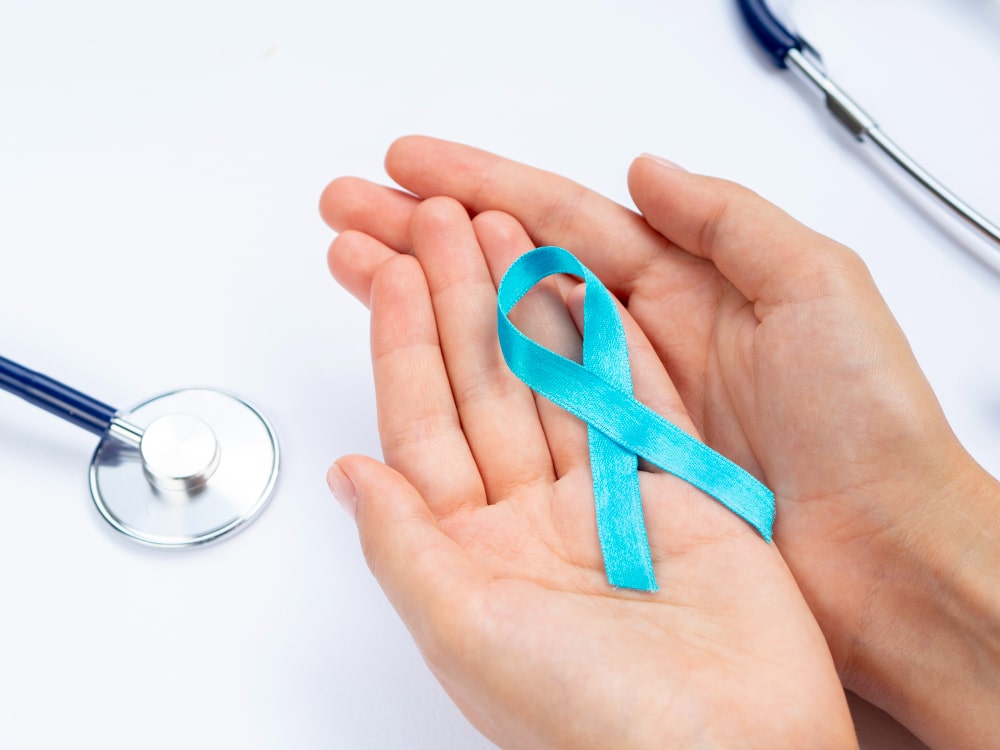The prostate is an organ found in men and surrounds the urethra, which carries urine out of the body. Diseases such as prostate enlargement or cancer that occur in the prostate can block the flow of urine, making it difficult to urinate and causing pain. Treatment of prostate diseases may vary depending on the type and severity of the disease. In some cases, such as benign prostatic hyperplasia (BPH) or prostate inflammation, medication is used to relieve symptoms, while in more serious cases, such as prostate cancer, routine cancer treatments and methods such as even surgical intervention may be required. In Turkey, one of the countries that closely follows the developments in the diagnosis and treatment of prostate disease, the treatment of the disease is carried out by experienced doctors.
What is Prostate?
The prostate is an organ located near the lower end of the urinary tract in men. This organ also acts as a gland that produces secretions and is located between the penis and the rectum under the bladder. The prostate is part of the reproductive system and serves as a connection between the urinary bladder and the urinary canal. It contributes to the formation of semen fluid with prostate secretions.
How Is Prostate Treatment?
Prostate problems can be treated with different methods depending on the symptoms and severity. The treatment of prostate disease in Turkey is carried out by specialists and experienced doctors in the field. According to the prostate problem, the treatment options are as follows:
- Prostatitis: Prostatitis is an inflammation of the prostate and can cause symptoms such as difficulty urinating, frequent urination, pelvic pain. There are different treatment options such as antibiotics, anti-inflammatory drugs, hot water baths, pelvic floor exercises, and other alternative methods.
- Prostate enlargement: The enlargement of the prostate can cause blockage in the urinary tract, making it difficult to urinate. Drug therapy includes medications that help shrink the prostate. Prostate enlargement can be treated with different methods, such as surgery or laser.
- Prostate Cancer: Because prostate cancer is a slowly progressing type of cancer, it is carefully monitored at the beginning of the disease without starting any treatment. There are different treatment options available, such as radiation therapy, chemotherapy, surgical intervention, hormone therapy and immunotherapy.
How Is the Prostate Treatment Process Performed?
Prostate diseases can be of different types, and their treatment may also vary depending on the type of disease, severity, and a person’s general state of health. In general, the prostate treatment process consists of the following steps:
- Performing the necessary examinations and examinations for diagnosis
- Determination of treatment options and selection of treatment method
- Starting treatment applications
- Regular implementation of follow-up and controls

What Are the Things to Be Considered for Prostate Treatment?
There are several important points that patients should pay attention to during the prostate treatment process. These can be listed as follows:
- Regular use of medications in accordance with the treatment plan
- Not interrupting the regular check-ups recommended by your doctor
- Adopting a healthy lifestyle
- Talking to your doctor about what you can do about the side effects seen during treatment
- Receiving psychological support to make it easier to cope with a serious illness such as prostate cancer
- Having follow-ups to monitor the likelihood of recurrence of the disease after prostate cancer treatment
- Not being exposed to the cold air
Who Gets Prostate Disease?
Prostate disease is a health problem seen in men. Although the disease can be seen in every adult man, it becomes more common as age advances. Prostatitis is a condition of inflammation of the prostate and is usually seen in men between the ages of 30 and 50. This condition can occur mainly due to sexually transmitted infections and urinary tract infections. It may also be more common in people with a family history or a high-fat diet.
What are the Symptoms of Prostate Disease?
The symptoms of prostate disease may vary depending on the type and severity of the disease. In general, the common symptoms of prostate diseases are:
- Frequent urination
- Difficulty urinating
- Blood in the urine
- Weak flow of urine
- Inability to urinate
- Urinary incontinence
- Urinary tract infections
- Sexual dysfunction disorders
What are the sub-categories of Prostate Disease?
Men are at risk for prostate-related diseases. Diseases that occur in the prostate can sometimes be conditions that can be treated with medications and are not serious, and sometimes there can be more serious problems such as cancer. Some of the diseases that affect the prostate are as follows:
- Prostatitis
- Prostate enlargement (Benign prostatic hyperplasia)
- Prostate cancer

What is Prostate Cancer?
Prostate cancer is the uncontrolled growth and proliferation of cancer cells that form in the prostate gland. Prostate cancer is a slow-progressing type of cancer, and therefore cancer may not show any symptoms in its early stages. But in the following periods, symptoms such as difficulty urinating, bloody urine or bloody semen, stiffness or a feeling of pain in the genital area may occur. One of the most important risk factors for prostate cancer is that one of the family members has had prostate cancer or breast cancer.
How Is Prostate Treatment?
Treatment for prostate cancer can be determined by a person’s age, general health status, the stage and spread of cancer. Treatment of prostate cancer is usually carried out by the following methods:
- Follow-up
- Surgical intervention
- Radiation therapy
- Hormone therapy
- Chemotherapy
- Immunotherapy
How Should Nutrition Be in the Prostate Cancer?
In the treatment of prostate cancer, nutrition is important for the management of the disease and the success of the treatment process. Some nutritional recommendations that should be considered in the treatment of prostate cancer are as follows:
- Creating a diet consisting of fresh fruits and vegetables, whole grains, low-fat proteins
- Avoiding high-fat foods such as fatty meats, full-fat dairy products and processed foods
- Paying attention to consuming antioxidant-rich foods
- Consuming plenty of liquids such as water and herbal tea to reduce urinary tract symptoms and facilitate the flow of urine
- Paying attention to taking enough vitamin D
The Use of Radiation Therapy in the Treatment of Prostate Cancer
In the treatment of prostate cancer, radiation therapy is a treatment method used to kill cancer cells or stop their growth. Radiation therapy targets and kills cancer cells using high-energy radiation.

Side Effects of Radiation Therapy in the Treatment of Prostate Cancer
Radiation therapy is an effective method used to treat prostate cancer; however, side effects may occur after treatment. These may include difficulty urinating, decreased sexual function, fatigue, intestinal problems, and skin irritation.
Radiation Therapy for Prostate Cancer Treatment
Radiation therapy means the same as the radiation therapy mentioned above and is one of the methods used to treat prostate cancer. In radiation therapy, high-energy rays are used to kill cancer cells or control their growth. Radiation therapy can be of two main types: external radiation therapy and brachytherapy. External beam therapy targets the killing of cancer cells using high-energy rays from an external machine. Brachytherapy, on the other hand, aims to kill cancer cells by placing radioactive substances directly into the prostate tissue.
Does Prostate Cancer Cause Bleeding in Radiation Therapy?
During radiation therapy, damage to the prostate tissue and surrounding tissues may occur. This damage can cause damage to other organs located near the prostate, such as the urinary tract or rectum. In this case, bleeding may occur.
Side Effects of Radiation Therapy in Prostate Cancer
Side effects of radiation therapy may include fatigue, urinary tract symptoms, skin irritation, sexual dysfunctions, and intestinal symptoms. However, these side effects are often temporary and may improve after treatment.
Side Effects of Hormone Therapy in Prostate Cancer
In the treatment of prostate cancer, hormone therapy is used to stop the growth of cancer cells. Hormone therapy may cause some side effects. Some of the side effects that may occur are as follows:
- Weakening of the bones
- Weight gain
- Breast growth and tenderness
- The risk of diabetes
- The risk of heart disease
- Sexual dysfunction
- Hot flashes
- Psychological effects
- Fatigue
What is Prostate Enlargement?
Prostate enlargement also called BPH (benign prostatic hyperplasia) in medicine, is a disease that occurs as a result of benign enlargement of the prostate gland. This condition can make it difficult to urinate as a result of the prostate pressing the urinary tract. BPH is more common in older men and although it does not lead to a serious health problems, it can affect the quality of life.
How Is the Treatment for Prostate Enlargement?
Among the commonly applied treatment options for prostate enlargement may be drug therapies and surgical interventions. Drug therapy can be used to reduce the severity of symptoms and stop prostate enlargement. Surgical intervention, on the other hand, can be performed to remove or shrink the prostate in more severe cases and in cases where the drug does not respond.

Frequently Asked Questions About Prostate Treatment
Among the frequently asked questions in prostate treatment may include the following:
- Which department treats prostate treatment?
Urology specialists are usually consulted for the diagnosis and treatment of prostate disorders.
- How is carob flour used in the treatment of prostate?
Carob flour can be consumed by adding it to meals or drinks to relieve the symptoms of prostate enlargement.
- Is balsam pear useful in prostate treatment?
Although it is thought that balsam pear may be useful for prostate treatment, there is not enough scientific evidence about this subject yet.
- Pumpkin seeds for herbal treatment of prostate
The zinc, magnesium, iron, vitamin E and antioxidants found in pumpkin seeds can help relieve the symptoms of prostate enlargement.
The Best Prostate Doctors in Turkey
Prostate problems can be treated more easily when diagnosed early. Turkey, one of the leading countries in health technology, can be safely preferred for prostate treatment. Prostate screening and treatments at Liv Hospital are performed by distinguished and successful doctors in their field. You can call us to get detailed information about prostate treatment. You can get to know the advantages of prostate treatment in Turkey and witness the difference of Liv Hospital. From your first phone call to the end of your treatment, the Liv Hospital International Health Services Team will not leave you alone.



